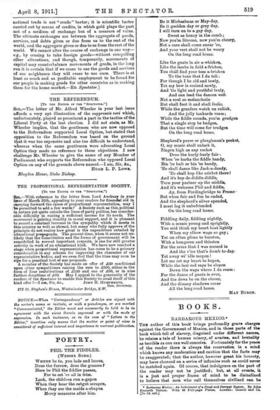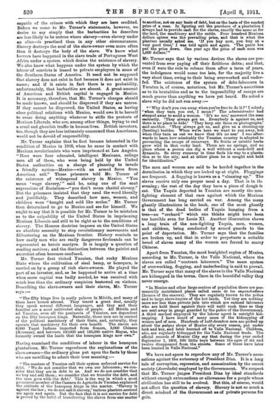BOOKS.
BARBAROUS MEXICO.* Tax author of this book brings profoundly grave charges against the Government of Mexico, and in those parts of the book which tell of slavery, disguised under different names, he relates a tale of human misery, of avariee, and brutality as terrible as one can well conceive. Fortunately for the peace of the reader there is always the reservation in a mind which knows any moderation and caution that the facts may be exaggerated; that the author, however great his honesty, may have chanced on a series of infamies such as could never be matched again. Of course, that indulgence on the part of the reader may not be justified; but, at all events, it is a just and proper frame of mind to be disinclined to believe that men who call themselves civilised can be
• Barbarous Merits An Indictment of a Crust and Corrupt System. By John Kenneth Turner. With 48 Full-page Plates. London: Cassell and Co. [7s. 6d. net.]
capable of the crimes with which they are here credited. Before we come to Mr. Turner's statements, however, we desire to say simply that the barbarities he describes are less likely to be untrue where slavery—even slavery under an alias—is practised than in any other circumstances. Slavery destroys the soul of the slave-owner even more often than it destroys the body of the slave. We know what horrors have happened in the slave trade of Portuguese West Africa under a system which denies the existence of slavery.
We also know what happens under the system by which the labour of convicts is leased to private employers in some of the Southern States of America. It need not be supposed that slavery does not exist in fact because it does not exist in name ; and if it exists in fact there is no probability, unfortunately, that barbarities are absent. A great amount of American and British capital is engaged in Mexico.
It is necessary, therefore, that Mr. Turner's charges should be made known, and should be disproved if they are untrue.
If they cannot be disproved, the United States, as having close political relations with Mexico, would owe it to herself to cease doing anything whatever to stifle the protests of Mexican Liberals, who are, among other things, trying to end a cruel and ghoulish traffic in human lives. British investors, too, though they are less intimately concerned than Americans, would not be devoid of responsibility.
Mr. Turner explains that he first became interested in the condition of Mexico in 1908, when he came in contact with Mexican revolutionists who were imprisoned at Los Angeles. "Here were four educated, intelligent Mexicans, college men all of them, who were being held by the United States authorities on a charge of planning to invade a friendly nation—Mexico—with an armed force from American soil." These prisoners told Mr. Turner of the existence of widespread slavery in Mexico. " You mean wage slavery," said he, using one of the cant expressions of Socialism—" you don't mean chattel slavery." But the prisoners insisted that they used the word literally and justifiably. They described how men, women, and children were "bought and sold like mules." Mr. Turner then determined to go to Mexico and see for himself. We ought to say that it is possible for Mr. Turner to be mistaken as to the culpability of the United States in imprisoning
Mexican Liberals and still to be right as to the conditions of slavery. The Monroe doctrine imposes on the United States an absolute necessity to stop revolutionary movements and filibustering on the Mexican frontier. History reminds us how easily men who are really dangerous firebrands can be
represented as heroic martyrs. It is largely a question of reading motives ; and the distinction between the patriot and anarchist often becomes confused.
Mr. Turner first visited Yucatan, that rocky Mexican State where the cultivation of sisal hemp, or henequen, is carried on by a group of rich slave-owners. He played the part of an investor, and, as he happened to arrive at a time when more capital was badly needed, he was received with much less than the ordinary suspicion bestowed on visitors. Describing the slave-owners and their slaves, Mr. Turner says :—
" The fifty kings live in costly palaces in Merida, and many of them have homes abroad. They travel a great deal, usually they speak several different languages, and they and their families are a most cultivated class of people. All Merida, and all Yucatan, even all the peninsula of Yucatan, are dependent on the fifty benequen kings. Naturally, these men are in control of the political machinery of their State, and, naturally, they operate that machinery for their own benefit. The slaves are 8,000 Yaqui Indians imported from Sonora, 3,000 Chinese (Koreans), and between 100,000 and 125,000 native Mayas, who formerly owned the lands that the henequen kings now own."
Having examined the conditions of labour in the henequen plantations, Mr. Turner reproduces the explanations of the slave-owners—the ordinary gloss put upon the facts by those who are unwilling to admit their true meaning :—
" The masters of Yucatan call their system enforced service for debt. We do not consider that we own our labourers ; we con- sider that they are in debt to us. And we do not consider that we buy and sell them ; we consider that we transfer the debt, and the man goes with the debt.' This is the way in which a most prominent member of the Camara do Agricola de Yucatan explained the attitude of the henequen kings in the matter. ' Slavery is against the law ; we do not call it slavery,' various planters assured me again and again. But the fact that it is not service for debt is proved by the habit of transferring the slaves from one master to another, not on any basis of debt, but on the basis of the market price of a man. In figuring out the purchase of a plantation I always had to provide cash for the slaves, exactly the same as for the land, the machinery and the cattle. Four hundred Mexican dollars apiece was the prevailing price, and that is what the planters usually asked me. 'If you buy now, you buy at a very good time,' I was told again and again. 'The panic, has put the price down. One year ago the price of each man was 1,000 dollars.'"
Mr. Turner says that by various devices the slaves are pre- vented from ever paying off their fictitious debts ; and that, even if were the rule to release them after a term of years, the indulgence would come too late, for the majority live a very short time, owing to their being overworked and under- fed. The existence of the system of debt-labourers in Yucatan is, of course, notorious, but Mr. Turner's assertions as to its brutalities and as to the impossibility of escape are much graver than anything we have yet heard. He asked a slave why he did not run away:—
" Why don't you run away when you're free to do it P ' I asked ; 'when they turn you out, I mean ?" The achninistrador had stepped away to scold a woman. 'It's no use,' answered the man earnestly. `They always get us. Everybody is against us, and there is no place to hide.' They keep our faces on photographs,' said another. They always get us, and give us a cleaning-up (beating) besides. When we're here we want to ran away, but when they turn us out we know that it's no use.' I was after- wards to learn how admirably the Yucatan country is adapted to preventing the escape of runaways. No fruits or eatable herbs grow wild in that rocky land. There are no springs, and no place where a person can dig a well without a rock-drill and dynamite So every runaway in time finds his way to a planta- tion or to the city, and at either place he is caught and held for identification."
The men and women are said to be herded together in the dormitories in which they are locked up at night. Floggings are frequent. A flogging is known as a "cleaning up." The slaves receive only one proper meal a day. That is in Vat evening ; the rest of the day they have a piece of dough to eat. The Yaquis deported to Yucatan are mostly the non.
fighting element of that race against which the Mexican Government has long carried on war. Among the many ghastly illustrations in the book, one of the most ghastly is that of the dead bodies of Yaquis hanging from a tree—an "orchard" which one thinks might have been too horrible even for Louis XI. Another illustration shows a long train of the non-fighting Yaquis, men, women, and children, being conducted by armed guards to the point of deportation. Mr. Turner says that the families are broken up, and that in order to perpetuate a suitable
breed of slaves many of the women are forced to marry Chinese.
Apart from Yucatan, the most benighted region of Mexico, according to Mr. Turner, is the Valle Nacional, where the
slaves are called "contract labourers." The same system of overworking, flogging, and underfeeding is said to prevail.
Mr. Turner says that many of the slaves in the Valle Nacional are kidnapped in the towns. Once in the beautiful valley they never emerge.
" In Mexico and other large centres of population there are per- manently maintained places called eases de los enganchaclores (houses of the snarers). They are regularly known to the police and to large slave-buyers of the hot lands. Yet they are nothing more nor less than private jails into which are enticed labourers who are held there against their will until such time as they are sent away in gangs guarded by the police of the Government. A third method employed by the labour agent is outright kid- napping. I have heard of many cases of the kidnapping of women and of men. Hundreds of half-drunken men are picked up about the plaque shops of Mexico city every season, put under lock and key, and later hurried off to Valle Nacional. Children, also, are regularly kidnapped for the Valle Nacional trade. The official records of Mexico City say that during the year ended September 1, 1908, 360 little boys between the ages of six and twelve disappeared from the streets. Some of these have later been located in Valle Nacional."
We have not space to reproduce any of Mr. Turner's accu- sations against the autocracy of President Diaz. It is a long
tale of corruption, repression, and assassination by the secret society (Acordada) employed by the Government. We suspect that Mr. Turner judges President Diaz by ideal standards without enough extenuation or allowances for a people whose civilisation has still to be evolved. But this, of course, would not affect the question of slavery. Slavery is not so much a direct misdeed of the Government as of private persons for gain.











































 Previous page
Previous page